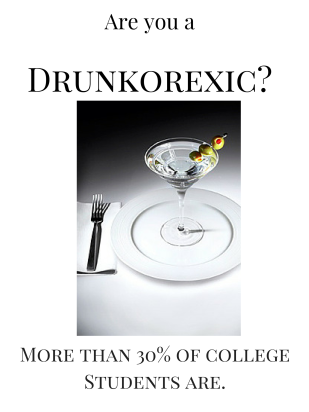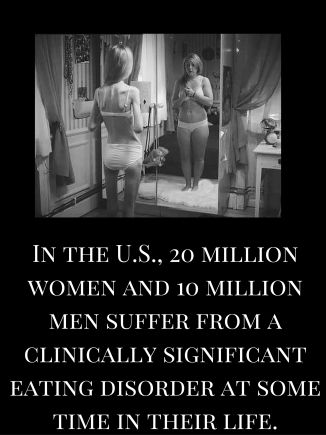
An average college student will take in about 900-1,200 calories from one night of drinking alone.
Sound like too much? It is really not.
An average beer has about 150 calories. But let’s be real, college students are not stopping at just one. So, how many is in a six-pack? A whopping 800 calories.
When everyone at the party gets together to do a round of vodka shots, each one is totaling out to be 100 calories each.

Clearly, these calories can add up quick. Especially for students whose weekends start on “Thirsty Thursday” and do not end until Sunday morning.
College students across the country have found a new way to drink their weekends away without having to worry about their jeans getting any tighter: Drunkorexia.
For those who have never heard of this dangerous new trend, it can be described as the restriction of food during the day, in an attempt to compensate for the calories consumed at night from drinking.
In other words: Eat less, drink more.
Sounds like a win-win right? The estimated 30 percent of college students who have tried this dangerous trend seem to think so.
Fear of weight gain, peer pressure and the desire to get drunk faster are all reasons students may be skipping lunch and dinner before heading out for the night.
Drunkorexia is happening everywhere and Cabrini students seem to know a lot about both the trend and its risk factors.
Jen Grenauer, senior exercise science and health promotion major, believes that even though students know how dangerous it is to drink on an empty stomach, they do it anyway.
“I have a friend that never eats before she drinks,” Grenauer said. “I think she does this because she does not want to feel or look ‘bloated’ when she goes out.”
Grenauer also believes this trend is far more common in women than in men.
“From a female standpoint, I know girls want to look and feel their best when they go out,” Grenauer said. “In order to achieve this, some girls believe they have to skip a meal or two prior to drinking.”
So what exactly are the dangers to skipping meals before heading out for the night?
Studies say that drinking after starving one’s self for a long period of time is far more dangerous than just drinking on an empty stomach.
The reason is that when the body is starved, it does not get the essential nutrients it needs. Also, alcohol does not add any nutritional value. The combination of a starved body, a lack of nutrients and alcohol can be a deadly one.
When there is no food in the stomach to absorb the alcohol being taken in, the effects of alcohol hit the body much stronger and faster. When these effects kick in, scary consequences can include: blackouts, brain damage, difficulty concentrating and forgetfulness.
Brooke Hagan, sophomore elementary and special education major, has seen drunkorexia happen many times on Cabrini’s campus.
“For girls, I have noticed that it is mainly about them looking better in their outfits,” Hagan said. “Girls tend to feel more bloated when drinking and my friends that have done this usually say things like: “Well I don’t want to look or feel disgusting in pictures so I just won’t eat.”
Hagan believes guys who participate in drunkorexia may have an entirely different set of reasons for doing it.
“I believe guys may do this because they just want to get drunk faster,” Hagan said. “There is a stereotype that girls are able to drink less and get drunk faster, so guys may feel that skipping meals is an easier way for them to do the same.”
Junior biology major Todd Walker is a guy on Cabrini’s campus who has actually followed this trend before.

“In the past if I’ve wanted to spend less money on alcohol or get drunk faster, I have skipped meals during the day,” Walker said. “When I’ve done this, I have felt thinner and better about my body while drinking.”
This trend is not only happening at Cabrini and it is taking both small and large campuses across the country by storm.
Renee Kontos is a junior chemistry major at Saint Joseph’s University in Philadelphia.
Kontos has also seen this scary trend around her own college campus.
“I definitely have heard friends and others talk about not eating before a night of drinking,” Kontos said. “Even sometimes in the past if I know I’m wearing a certain outfit, I’ll try to be more careful of what I’m eating so I don’t get ‘bloated.’ However, I do usually try to eat more before going out because I know the consequences of drinking on an empty stomach.”
Kontos has also seen girls not only skip meals before going out, but also take certain actions after the night is over.
“I’ve had friends make themselves throw up because they think they need to ‘make themselves feel better,’” Kontos said. “Seeing things like this makes me wonder if there are other underlying things there, like body image or self esteem issues.”
Many girls who are participating in this trend do suffer from body image and other underlying issues.
Nowadays, no matter the temperature, one can find girls going out for the night in tank tops, dresses or skirts. Constantly wearing outfits that expose a lot of the body can cause for a lot of insecurities. Wearing less clothes allows for girls to be more critical of their bodies and feel even more of a pressure to look perfect.
This pressure for perfection is even higher at larger universities, such as Penn State.
Cassie Collevecchio is a junior nutrition major at Penn State University and has found that many girls feel a lot of pressure to be thin.

“I joined a sorority late my sophomore year, and I have seen even more of this pressure in the Greek community,” Collevecchio said. “Some girls in various sororities believe that they need to be the ‘hottest’ group of girls so they can get invited to the best parties.”
Collevecchio has found that girls are willing to go to extreme, and often unhealthy, measures in order to be the “best looking.”
“There have been many instances where I’ve noticed girls simply skipping a meal during the day so they can get drunk faster or not ‘waste’ their daily calories,” Collevecchio said.
Clearly drunkorexia is a widespread trend that more and more students seem to be following.
Despite many students knowing the harmful effects it can have on their bodies, there is little indication that they will be putting a stop to their scary habits anytime soon.
“Just last weekend, my roommates and I were deciding whether or not to grab bagels on the way to a daylong party,” Collevecchio said. “My one roommate said: ‘We might as well wait to eat until later so we get drunk faster.'”



